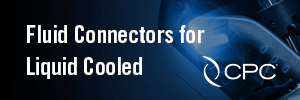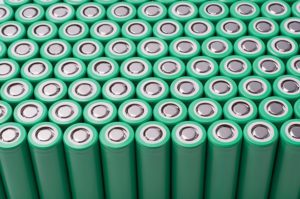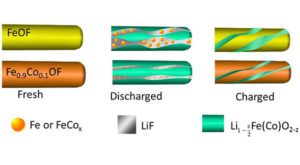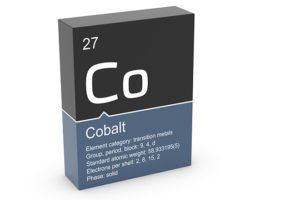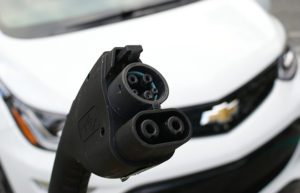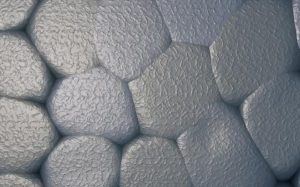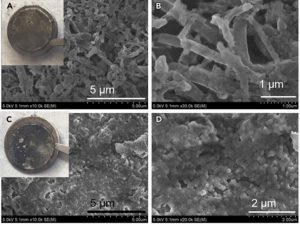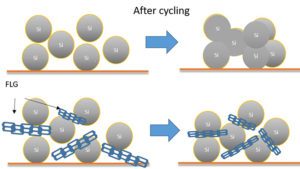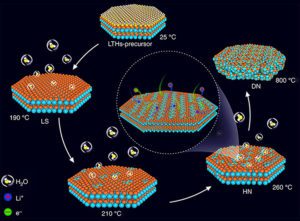Fast charging cold Li-ion batteries comes with the risk of lithium plating. When metallic lithium is formed in a battery, it can severely reduce battery lifespan and increase instability. Researchers from Penn State have suggested a solution to that problem that can provide 15-minute fast charging and a twelve-year battery lifespan in temperatures as low as… Read more »
Search Results Found For: "graphite"
Cambridge study reveals fast-charging potential of niobium tungsten oxides
Cambridge research has shed light on the potential of a previously ignored class of electrode material: niobium tungsten oxides. These compounds display several promising properties, including a lack of the dendrite formation which plagues graphite-based designs. They have a relatively large particle size and a structure that allows lithium ions to travel freely. This high transport rate can… Read more »
Iron trifluoride cathode could greatly increase energy density
Researchers from the University of Maryland and the DOE’s Brookhaven National Laboratory have developed a cathode material containing iron trifluoride (FeF3) that they say could triple the energy density of Li-ion batteries. Their research was published in Nature Communications. “Compared to the large capacity of the commercial graphite anodes used in lithium-ion batteries, the capacity of the cathodes is… Read more »
New R&D partnership aims to put Québec in the Li-on battery race
Hydro-Québec and Nouveau Monde Graphite (NMG) have reached a research and licensing agreement that they hope will make Québec a contender in the booming battery business. The government-owned utility Hydro-Québec will assist NMG in developing small-scale mining operations to produce graphite which will be used as anode material for Li-on batteries. NMG’s graphite operation began… Read more »
Critical Materials Institute to address lithium and cobalt demand
As the market for plug-in vehicles grows, so does the demand for the materials associated with production, particularly lithium and cobalt, which are used in Li-on batteries. The DOE’s Critical Materials Institute (CMI) is focused on recycling and reducing the demand for rare metals that may experience shortages in the future. The agency is also… Read more »
DOE awards $19 million for extreme fast charging research
The DOE is awarding $19 million in funding to 12 cost-shared research projects focused on “extreme fast charging,” which is defined as a system with power levels up to 400 kW and typical charging times of 15 minutes or less. Nine of the selected projects focus on advanced anodes, electrolytes, and battery cell designs: UC… Read more »
Self-healing anode eliminates dendrite buildup
Researchers at Rensselaer Polytechnic Institute (RPI) have demonstrated a “self-healing” lithium-metal anode that can eliminate dendrite buildup. Researchers are looking for ways to replace graphite anodes with lithium metal in order to boost energy density. However (as regular Charged readers know), lithium metal anodes are plagued by the buildup of dendrites, branchlike protrusions that can grow… Read more »
Increasing concentration of LiFSI salt suppresses dendrite formation
Lithium metal is considered an ideal anode material due to its exceptional charge and storage capability, but it has a tragic flaw: root-like growths called dendrites, which can lead to short-circuiting and spontaneous combustion. Now, researchers at the University of Maryland (UMD) have announced a breakthrough in their quest to solve the dendrite issue. In… Read more »
Adding graphene girders to silicon electrodes could double battery life
Graphite has long been the default choice of material for anodes, but researchers dream of replacing graphite with silicon, which has ten times the gravimetric energy density. Unfortunately, silicon has several issues that limit its commercial use – it expands during lithiation, causing particles to agglomerate in ways that impede efficiency, and it is not… Read more »
Aqueous anode enables super-fast charging
An international team of scientists, including researchers from the DOE’s Argonne National Laboratory, has discovered an anode material that enables super-fast charging and offers stable operation over many thousands of cycles. In a recent article in Nature Communications, Argonne Battery Scientist Jun Lu and colleagues describe a water-bearing compound, lithium titanate hydrate, that could replace… Read more »



